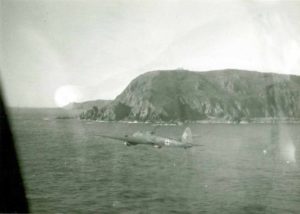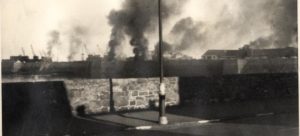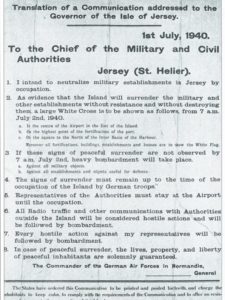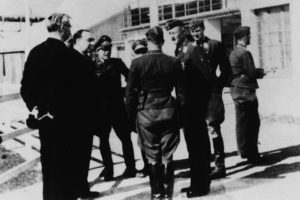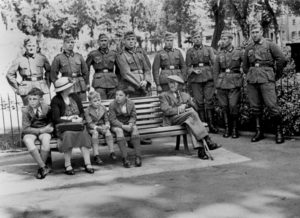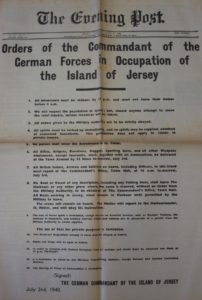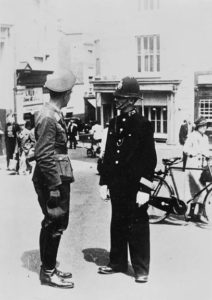The British government hoped that as open towns, the islands would be spared a German attack which would be costly in civilian lives as well as property damage. Indeed they even naively considered that the Germans would not even bother occupying the undefended islands, which might be able to sit out the war in isolation.
For the Germans, victoriously sitting in Normandy some 12 miles away, after sweeping through France, there was never any question of by-passing the Channel Islands and plans (Operation Green Arrow) had always contemplated their occupation. It was just a case of planning the assault on the islands and ensuring that German forces had sufficient superiority to complete the task.
The German Luftwaffe had been flying high level reconnaissance missions over the Channel Islands since the middle of June and had been assessing what the islands’ defences were and how best to deal with them. The Germans had noticed the high levels of activity around St Helier and St Peter Port harbours (the departure of troops as well as the evacuation of about a fifth of Jersey’s and nearly a half of Guernsey’s population) and had concluded it was all military related.
The Germans also noticed the many British fortifications around the coasts of the islands, which despite the fact that they were between a hundred and a hundred and sixty years old, were considered current military positions. As a consequence, the Germans believed that there would be a fight by the British before the Channel Islands could be occupied, and that they would need to gather sufficient troops and resources to ensure that the islands were successfully taken.
How could the Germans have reached such conclusions? Unfortunately, the British government, never publicly announced that the Channel Islands had been de-militarised and effectively abandoned. The government gave no reason why such an announcement wasn’t made, and as a consequence, the possible reasons have been hotly debated ever since.
Perhaps they hadn’t done so because it would have been a humiliating admission that the British had no resources to defend the islands after the defeats and retreats in France? Or that by telling the Germans, it would only encourage them to occupy the islands even if they had no present intention to do so? It was quite clear however that the British were embarrassed and didn’t want to broadcast to the British people that part of the British Isles had been abandoned. Indeed, the British public had been told by Winston Churchill on 18th June, after the decision to demilitarise – “What General Weygand has called the battle of France is over. The battle of Britain is about to begin”.
After the chaos of de-militarisation and civilian evacuation had been completed, the Channel Islands returned to an uneasy period of calm for the last week of June. The mail-boat service to the United Kingdom resumed twice weekly and the export of the important crops of potatoes and tomatoes restarted from Jersey and Guernsey respectively. The German Luftwaffe continued their reconnaissance sorties and they wondered why no attempt had been made to fire on their planes. Perhaps the British were trying to lure them in to approaching closer, or indeed even invading, before unleashing their guns and other defences on them?
To answer that question, the Germans resolved to provoke the British defences by sending armed reconnaissance bombers on the 28th June. On that day Heinkel bombers bombed and strafed the harbours in Jersey and Guernsey killing 44 people and wounding many more. One section of each of the islands’ communities were tragically and specifically targeted – farmers. Jersey potato growers and Guernsey tomato growers were down at the docks in their lorries loaded with produce ready to ship to Britain, the latter of which were mistaken for troop transports and were machine gunned by the low flying bombers.
Still the Germans wondered why there was no returning fire and they were concerned that the British were continuing the elaborate trap to lure them in.
They didn’t, however, need to wait long to get an answer. With the British government officials being advised of the attacks by telephone as they were taking place, an urgent message confirming the demilitarisation of the Channel Islands was sent to the Germans via the United States Embassy in Berlin. This was all the confirmation that the Germans needed!
On the 30th June, German troop transport planes landed in Guernsey and the occupation began in that island.
On the 1st July, the Germans dropped an ultimatum by plane in Jersey requiring surrender by the island immediately and advising that German forces were to land on the following day the 2nd July to occupy Jersey.
Whilst the Jersey authorities immediately complied with the surrender conditions, a lone Luftwaffe aircraft landed at Jersey airport during the afternoon of the 1st, and finding the Island undefended, it was followed later that evening by troop transport aircraft full of troops. So began the German occupation of Jersey.
It was a deep shock to all Channel Islanders to see German troops around the islands. Those troops had been given strict instructions to respect the Islanders, for this was to be the model of the anticipated occupation of Britain which the Germans boasted would be complete by mid August, 6 weeks later.
However the politeness of the troops was tempered on the day following the first day of occupation by the first of many hundreds of German orders which curtailed the rights of the now occupied islanders over the next 5 years.
For the first German arrivals, the occupation had been achieved much more easily than they had anticipated. It also provided an opportunity to demonstrate to the citizens of Britain that they would be fairly and well treated when the anticipated invasion of England was complete. Photos of British Policemen and German soldiers were great propaganda!

